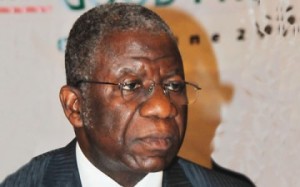NIGERIA has finally exited from the League of Nations on the watch list of the global Financial Action Task Force (FATF) – the body that is combating corruption practices related to money laundering and terrorist financing.
The development was announced recently in Paris, France, during the FATF’s plenary session, according to the Chairman of Nigeria’s Presidential Committee on Financial Action Task Force, Stephen Oronsaye.
Oronsaye had last month at an FATF function in Abuja, expressed optimism that the country would this month be exited from the list following the full implementation of the mutually agreed action plan and the exhibition of a clear political commitment to continue the development of its Anti-Money Laundering/Combating the Financing of Terrorism (AML/CFT) regime.
With this development, Nigeria is expected to harvest improved foreign direct investments into the country while Nigerians travelling overseas are now to enjoy dignified treatment, particularly at the ports of entry of their respective destinations, by security operatives of those countries.
In a statement announcing FATF’s removal of Nigeria from the list, Oronsaye said the task force’s plenary session voted unanimously to expunge the country from the list of jurisdictions.
He said the body in a statement explained that the delisting of Nigeria followed the country’s full implementation of the mutually agreed action
plan and the exhibition of a clear political commitment to continue the development of its Anti-Money Laundering/Combating the Financing of Terrorism (AML/CFT) regime.
FATF indeed expressed appreciation of Nigeria’s “significant progress in improving its AML/CFT regime and notes that Nigeria has established the legal and regulatory frame-work to meet its commitment in its action plan regarding the strategic deficiencies that the FATF had identified in February 2010. Nigeria is therefore no longer subject to FATF’s monitoring process under its on-going global AML/CFT compliance process.”
The FATF’s statement added that Nigeria would continue to address the full range of AML/CFT issues identified in its mutual evaluation report.
During the recent on-the-site visit of the Regional Review Group (RRG) for Africa and the Middle East to Nigeria, the team held meetings with the Minister of Finance, Attorney-General of the Federation, Office of the National Security Adviser, senior members of government departments, law enforcement agencies, the judiciary and regulatory authorities.
The review team also noted Nigeria’s political commitment to continue to develop and strengthen the AML/CFT frame-work as was very clearly stated by the ministers.
The RRG team further observed that the government confirmed its resolve to ensure that the relevant agencies working on AML/CFT issues are adequately empowered through legal and financial resources to fulfill their roles.
Hitherto, Nigeria used to receive technical assistance from the International Monetary Fund to develop a risk-based approach to AML/CFT supervision. This has resulted in the development of similar procedures across all regulatory authorities as well as the financial intelligence unit, namely the Central Bank of Nigeria, the Securities and Exchange Commission, the National Insurance Commission and the Nigerian Financial Intelligence Unit.
The authorities are now engaging with the World Bank to undertake a national risk assessment to provide a basis for further developing the overall AML/CFT regime and strategic frame-work. The presidential committee is committed to continuing the co-ordination of this process.
Due to the listing of Nigeria as a high-risk jurisdiction by the FATF, many financial institutions treaded cautiously in transacting business with their Nigerian counterparts.
With the delisting, Nigeria and its businesses are now free from the repercussions of being labelled a non-co-operating and high-risk jurisdiction in the aspect of money laundering and terrorist financing. It is expected that there will be great reduction in the costs and time-line of financial transactions between individuals and institutions between Nigeria and other countries.
Besides, the guarantee of improved global rating for the country’s financial system, the amended laws and regulations will strengthen the enforcement and regulatory capacities of relevant institutions in Nigeria.











